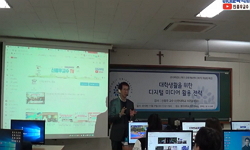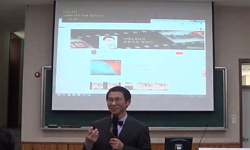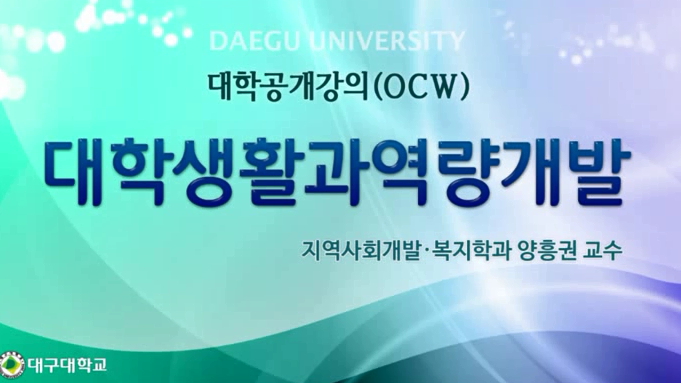본 연구는 문제해결학습에서 학습자의 선수지식 수준에 따른 소거된 WOE 정보 유형이 인지부하와 문제해결력에 미치는 효과를 분석하고, 학습자의 선수지식을 고려한 효과적이고 효율적인 W...
http://chineseinput.net/에서 pinyin(병음)방식으로 중국어를 변환할 수 있습니다.
변환된 중국어를 복사하여 사용하시면 됩니다.
- 中文 을 입력하시려면 zhongwen을 입력하시고 space를누르시면됩니다.
- 北京 을 입력하시려면 beijing을 입력하시고 space를 누르시면 됩니다.

문제해결학습에서 학습자의 선수지식 수준에 따른 Worked-Out Example(WOE) 정보 유형의 효과 연구 = The Effect of Faded Information Based on Learners’ Prior Knowledge in Problem-Solving Learning
한글로보기https://www.riss.kr/link?id=A106326295
- 저자
- 발행기관
- 학술지명
- 권호사항
-
발행연도
2019
-
작성언어
-
-
주제어
소거된 정보 ; 해결된 예 ; 선수지식 ; 인지부하 ; 문제해결학습 ; 대학생 ; faded information ; worked-out example ; prior knowledge ; cognitive load ; problem-solving learning
-
KDC
373
-
등재정보
KCI등재
-
자료형태
학술저널
-
수록면
799-820(22쪽)
-
KCI 피인용횟수
1
- DOI식별코드
- 제공처
-
0
상세조회 -
0
다운로드
부가정보
국문 초록 (Abstract)
본 연구는 문제해결학습에서 학습자의 선수지식 수준에 따른 소거된 WOE 정보 유형이 인지부하와 문제해결력에 미치는 효과를 분석하고, 학습자의 선수지식을 고려한 효과적이고 효율적인 WOE 소거 전략을 제안하는 것을 목적으로 한다. 연구 참여자는 대학생 22명이었고, 연구 대상자는 선수지식 수준과 소거된 WOE 정보 유형에 따라 네 집단으로 나누어 문제해결학습을 진행하였다(선수지식 수준이 높고 ‘문제해결원리’ 정보가 소거된 WOE를 제공한 그룹, 선수지식 수준이 높고 ‘문제해결방법’ 정보가 소거된 WOE를 제공한 그룹, 선수지식 수준이 낮고 ‘문제해결원리’ 정보가 소거된 WOE를 제공한 그룹, 선수지식 수준이 낮고 ‘문제해결방법’ 정보가 소거된 WOE를 제공한 그룹). 학습이 끝난 후 인지부하와 문제해결력을 측정하여 이원분산분석을 실시하였다. 연구 결과에 의하면 선수지식이 높으면서 문제해결원리 정보가 소거된 WOE를 제공받은 그룹의 내재적, 외재적 인지부하가 가장 낮고 본유적 인지부하가 가장 높았으며 문제해결력도 가장 높았다. 반면 선수지식 수준이 낮으면서 문제해결방법 정보가 소거된 WOE를 제공받은 그룹의 내재적, 외재적 인지부하가 가장 높고 본유적 인지부하가 가장 낮았으며 문제해결력도 가장 낮았다. 이를 통해 선수지식 수준이 높은 경우 문제해결원리를 완성해 나가는 WOE 정보 유형이 효과적이며 선수지식 수준이 낮은 경우에도 문제해결방법을 소거한 WOE 보다는 문제해결원리를 소거한 WOE 정보 유형이 효과적이라는 것을 알 수 있었다.
다국어 초록 (Multilingual Abstract)
The purpose of this study was to identify the effect of faded information based on learners’ prior knowledge, cognitive load and problem-solving competency in problem-solving learning. The participants were 22 university students who were divided in...
The purpose of this study was to identify the effect of faded information based on learners’ prior knowledge, cognitive load and problem-solving competency in problem-solving learning. The participants were 22 university students who were divided into 4 groups based on level of prior knowledge and type of faded information: a high prior knowledge with faded principle worked-out example (WOE) group, a high prior knowledge with faded-method WOE group, a low prior knowledge with faded principle WOE group and a low prior knowledge with faded-method WOE group. After problem-solving learning, the participants’ cognitive load and problem-solving competency were analysed using two-way ANOVA. The high prior knowledge with faded principle WOE group showed the lowest extraneous load, the highest germane load and the highest problem-solving competency. In addition, the faded principle WOE type was effective on the low prior knowledge group. Based on these results, a faded information strategy that considers learners’ prior knowledge is important, and a faded principle WOE strategy is more effective than a faded-method WOE strategy for both novices and experts.
목차 (Table of Contents)
- Ⅰ. 서 론 Ⅱ. 이론적 배경 Ⅲ. 연구 방법 Ⅳ. 연구 결과 Ⅴ. 결론 및 제언
- Ⅰ. 서 론 Ⅱ. 이론적 배경 Ⅲ. 연구 방법 Ⅳ. 연구 결과 Ⅴ. 결론 및 제언
참고문헌 (Reference)
1 류지헌, "인지 부하 측정을 위한 구인의 탐색 및 타당화" 한국교육정보미디어학회 15 (15): 1-27, 2009
2 홍정화, "문제해결과제에서 스캐폴딩 내용의 소거 전략이 인지부하 및 문제해결 성과에 미치는 영향" 한양대학교 대학원 2011
3 Renkl, A., "Worked-out examples : Instructional explanations support learning by self-explanations" 12 (12): 529-556, 2002
4 Paas, F. G., "Variability of worked examples and transfer of geometrical problem-solving skills : A cognitive-load approach" 86 (86): 122-133, 1994
5 Carroll, W. M., "Using worked examples as an instructional support in the algebra classroom" 86 (86): 360-367, 1994
6 Paas, F. G., "Training strategies for attaining transfer of problem-solving skill in statistics : A cognitive-load approach" 84 (84): 429-434, 1992
7 Renkl, A., "Toward an institutionally oriented theory of example-based learning" 38 (38): 1-37, 2014
8 Puntambekar, S., "Tools for scaffolding students in a complex learning environment: What have we gained and what have we missed?" 40 (40): 1-12, 2005
9 Sweller, J., "The use of worked examples as a substitute for problem solving in learning algebra" 2 (2): 59-89, 1985
10 Kalyuga, S., "The expertise reversal effect" 38 (38): 23-31, 2003
1 류지헌, "인지 부하 측정을 위한 구인의 탐색 및 타당화" 한국교육정보미디어학회 15 (15): 1-27, 2009
2 홍정화, "문제해결과제에서 스캐폴딩 내용의 소거 전략이 인지부하 및 문제해결 성과에 미치는 영향" 한양대학교 대학원 2011
3 Renkl, A., "Worked-out examples : Instructional explanations support learning by self-explanations" 12 (12): 529-556, 2002
4 Paas, F. G., "Variability of worked examples and transfer of geometrical problem-solving skills : A cognitive-load approach" 86 (86): 122-133, 1994
5 Carroll, W. M., "Using worked examples as an instructional support in the algebra classroom" 86 (86): 360-367, 1994
6 Paas, F. G., "Training strategies for attaining transfer of problem-solving skill in statistics : A cognitive-load approach" 84 (84): 429-434, 1992
7 Renkl, A., "Toward an institutionally oriented theory of example-based learning" 38 (38): 1-37, 2014
8 Puntambekar, S., "Tools for scaffolding students in a complex learning environment: What have we gained and what have we missed?" 40 (40): 1-12, 2005
9 Sweller, J., "The use of worked examples as a substitute for problem solving in learning algebra" 2 (2): 59-89, 1985
10 Kalyuga, S., "The expertise reversal effect" 38 (38): 23-31, 2003
11 Ge, X., "The design of scaffolding and fading: Research issues and challenges" The University of Hong Kong 19-24, 2016
12 van Merriënboer, J. J., "Ten steps to complex learning: A systematic approach to four-component instructional design" Routledge/Taylor & Francis Group 2012
13 van Merriënboer, J. J., "Strategies for programming instruction in high school: Program completion vs. program generation" 6 (6): 265-285, 1990
14 van Merriënboer, J. J., "Strategies for computer-based programming instruction : Program completion vs. program generation" 8 (8): 365-394, 1992
15 Chi, M. T., "Self-explanations : How students study and use examples in learning to solve problems" 13 (13): 145-182, 1989
16 Sherin, B., "Scaffolding analysis : Extending the scaffolding metaphor to learning artifacts" 13 (13): 387-421, 2004
17 van Gog, T., "Process-oriented worked examples: Improving transfer performance through enhanced understanding" 32 (32): 83-98, 2004
18 Mayer, R. E., "Nine ways to reduce cognitive load in multimedia learning" 38 (38): 43-52, 2003
19 Seta, K., "Learning phase model based scaffolding and its fading to facilitate collaborative learning of critical thinking" Springer 590-599, 2007
20 Atkinson, R. K., "Learning from examples : Instructional principles from the worked examples research" 70 (70): 181-214, 2000
21 van Merriënboer, J. J., "Instructional strategies and tactics for the design of introductory computer programming courses in high school" 16 (16): 251-285, 1987
22 Renkl, A., "How fading worked solution steps works–a cognitive load perspective" 32 (32): 59-82, 2004
23 Renkl, A., "From studying examples to solving problems: Fading worked-out solution steps helps learning" Lawrence Erlbaum Associates, Inc 393-398, 2000
24 Renkl, A., "From example study to problem solving : Smooth transitions help learning" 70 (70): 293-315, 2002
25 Chen, O., "Extending cognitive load theory to incorporate working memory resource depletion : evidence from the spacing effect" 30 (30): 483-501, 2018
26 Cierniak, G., "Explaining the split-attention effect: Is the reduction of extraneous cognitive load accompanied by an increase in germane cognitive load?" 25 (25): 315-324, 2009
27 Hancock-Niemic, M. A., "Example-based learning : exploring the use of matrices and problem variability" 64 (64): 115-136, 2016
28 Sweller, J., "Element interactivity and intrinsic, extraneous, and germane cognitive load" 22 (22): 123-138, 2010
29 Cooper, G., "Effects of schema acquisition and rule automation on mathematical problem-solving transfer" 79 (79): 347-362, 1987
30 Jung, J., "Effects of WOE Presentation Types Used in Pre-training on the Cognitive Load and Comprehension of Content in Animation-Based Learning Environments" 19 (19): 75-86, 2016
31 de Jong, T., "Cognitive load theory, educational research, and instructional design : some food for thought" 38 (38): 105-134, 2010
32 van Merriënboer, J. J., "Cognitive load theory and complex learning : Recent developments and future directions" 17 (17): 147-177, 2005
33 Paas, F. G., "Cognitive load theory : Instructional implications of the interaction between information structures and cognitive architecture" 32 (32): 1-8, 2004
34 Paas, F., "Cognitive load measurement as a means to advance cognitive load theory" 38 (38): 63-71, 2003
35 Sweller, J., "Cognitive load during problem solving : Effects on learning" 12 (12): 257-285, 1988
36 Sweller, J., "Cognitive architecture and instructional design" 10 (10): 251-296, 1998
37 Chi, M. T., "Categorization and representation of physics problems by experts and novices" 5 (5): 121-152, 1981
38 이효진, "CSCL에서 완성하기 과제의 소거 수준과 자신에게 설명하기 활동의 제공 방식이 협력부하 및 협력학습성과에 미치는 영향" 한국교육공학회 29 (29): 541-572, 2013
39 Salden, R. J. C. M., "A comparison of approaches to learning task selection in the training of complex cognitive skills" 22 (22): 321-333, 2006
동일학술지(권/호) 다른 논문
-
시뮬레이션 학습을 위한 부정맥 응급관리 시나리오 개발 및 효과연구
- 학습자중심교과교육학회
- 백경화(Baek, Kyoung Hwa)
- 2019
- KCI등재
-
백워드 설계모형에 기반한 2015 개정 가정과 교육과정 교수 · 학습 과정안 개발: 핵심개념 ‘관계’를 중심으로
- 학습자중심교과교육학회
- 박지현(Park Ji Hyun)
- 2019
- KCI등재
-
메타포(metaphor) 분석을 통한 장애인 행복에 대한 대학생들의 인식
- 학습자중심교과교육학회
- 백수진(Paik Su Jin)
- 2019
- KCI등재
-
중등예비교사의 다문화인식과 다문화수용성이 다문화 교수효능감에 미치는 영향
- 학습자중심교과교육학회
- 강미희(Kang, Mee–
- 2019
- KCI등재
분석정보
인용정보 인용지수 설명보기
학술지 이력
| 연월일 | 이력구분 | 이력상세 | 등재구분 |
|---|---|---|---|
| 2027 | 평가예정 | 재인증평가 신청대상 (재인증) | |
| 2021-01-01 | 평가 | 등재학술지 유지 (재인증) |  |
| 2018-01-01 | 평가 | 등재학술지 유지 (등재유지) |  |
| 2015-01-01 | 평가 | 등재학술지 유지 (등재유지) |  |
| 2011-01-01 | 평가 | 등재학술지 유지 (등재유지) |  |
| 2008-01-01 | 평가 | 등재학술지 선정 (등재후보2차) |  |
| 2007-01-01 | 평가 | 등재후보 1차 PASS (등재후보1차) |  |
| 2006-01-06 | 학술지명변경 | 외국어명 : Journal of Learner-Centered Curriculum and Instruction -> The Journal of Learner-Centered Curriculum and Instruction |  |
| 2006-01-01 | 평가 | 등재후보학술지 유지 (등재후보1차) |  |
| 2004-01-01 | 평가 | 등재후보학술지 선정 (신규평가) |  |
학술지 인용정보
| 기준연도 | WOS-KCI 통합IF(2년) | KCIF(2년) | KCIF(3년) |
|---|---|---|---|
| 2016 | 1.29 | 1.29 | 1.31 |
| KCIF(4년) | KCIF(5년) | 중심성지수(3년) | 즉시성지수 |
| 1.37 | 1.42 | 1.436 | 0.33 |





 스콜라
스콜라






